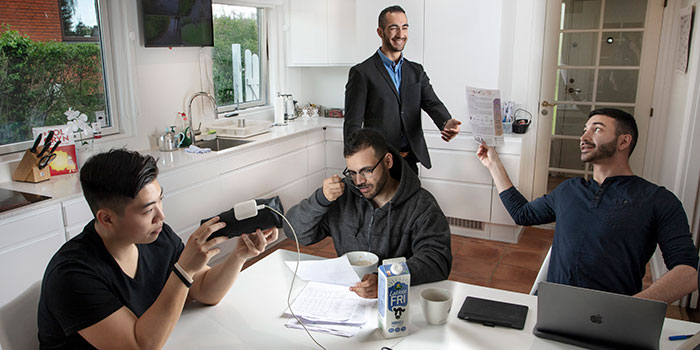DTU awards Student Startup of the Year to
Paragit Solutions for their sensor for early warning of Parkinson’s disease, ALS, and Alzheimer’s disease.
Four current and former DTU students have in no time developed a sleeve which can distinguish noise from vital information about musculoskeletal diseases.
The idea for a digital sensor that can warn of muscular rigidity, slow movements, and tremors was first pitched in DTU Skylab’s Open Innovation competition OiX in 2018. Ten months after the competition, and with a side trip to Silicon Valley in the US in the meantime, the sensor sleeve, Paragit Sleeve, is ready to be patented, and the investors are lined up.
“Our technology is unique in that it enables us to measure muscular rigidity and distinguish information about movements from other noise pulses in a sensor which patients can take home. It opens up completely new possibilities for early diagnosis of musculoskeletal diseases such as Parkinson’s disease and ALS, but also diseases such as Alzheimer’s. The sensor sleeve can also be used to assess the effect of medication or to test new drugs while the patients are at home,” says Mohammad Filfil, who is a student and the CEO of the startup company Paragit Solutions.
Hard discipline and team spirit
The four founders behind the company are current and former students at DTU or Copenhagen Business Academy, and they make it very clear that it requires financial resources, hard discipline, and extraordinary team spirit to maintain the momentum of the project while they are completing their studies at the same time. Therefore, all four of them have more or less moved in with Mohammad’s parents in their house in Hvidovre, where they work, eat, and brush their teeth together.
“We’re working completely coordinated and efficiently. We have a pact not to start new relationships, as it takes too much time and dedication. And we choose to be fully dedicated to this project, so we can execute our milestones in the correct order and very quickly,” says Mohammad Filfil.

Test on patients
The idea for the Paragit Sleeve originally arose because the students wanted to develop a sensor which patients could wear comfortably or take home with them and which could gather data about their movements. In tests on patients, the sensors in the sleeve have been able to separate all noise from the surroundings and can, according to Mohammad Filfil, capture data on muscular rigidity, slow movements, and tremors with 100 per cent accuracy.
Mohammad Filfil assesses that the invention can also be used for other purposes and, for example, improve Apple Watch’s new feature for measuring heart rhythm by holding one’s finger on the watch.
“The solution is met with quite a bit of criticism from doctors, who believe that Apple’s smartwatch doesn’t take signal noise into account and may therefore provide misleading notifications. For this, our technology may offer precise measurements,” says Mohammad.
Winners in Silicon Valley
Since the four founders of Paragit Solutions initially pitched their idea to OiX in 2018, Mohammad Filfil and Arvan Maani went to the United States to take courses in the development of medical devices at San Jose State University.
At the end of 2018, the team participated in Stanford’s Health Hackathon, and Paragit Solutions was awarded as the best innovation project in Silicon Valley Innovation Challenge 2018.